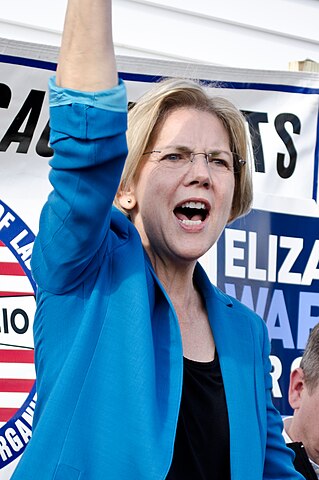
Photo by Tim Pierce (Own work) [CC BY-SA 3.0
(http://creativecommons.org/licenses/by-sa/3.0)],
via Wikimedia Commons.
Elizabeth Warren indicts "shockingly weak" enforcement
by Tom Sullivan

Photo by Tim Pierce (Own work) [CC BY-SA 3.0
(http://creativecommons.org/licenses/by-sa/3.0)],
via Wikimedia Commons.
If justice means a prison sentence for a teenager who steals a car, but it means nothing more than a sideways glance at a CEO who quietly engineers the theft of billions of dollars, then the promise of equal justice under the law has turned into a lie. – from Rigged Justice
In the first of what she promises will be annual reports on enforcement, Sen. Elizabeth Warren this morning released Rigged Justice: How Weak Enforcement Lets Corporate Offenders Off Easy. Calling the Obama administration's enforcement against corporate criminals "feeble," Warren's report cites 20 criminal and civil cases from 2015 in which authorities punished corporate crimes – where they were enforced at all – with a slap on the wrist. Prosecutors took only one of these cases to trial. She follows up with an op-ed in the New York Times, writing, "These enforcement failures demean our principles." The report begins:
Much of the public and media attention on Washington focuses on enacting laws. And strong laws are important – prosecutors must have the statutory tools they need to hold corporate criminals accountable. But putting a law on the books is only the first step. The second, and equally important, step is enforcing that law. A law that is not enforced – or weakly enforced – may as well not even be a law at all.
Despite its get-tough rhetoric, the report alleges that the Department of Justice fails "to impose any serious threat of punishment on corporate offenders ... The pattern of weak enforcement extends beyond the Justice Department to other enforcement agencies."
Simply put, talk is cheap.
The report slams the Securities and Exchange Commission (SEC) as "particularly feeble":
Not only does the agency fail to demand accountability, the SEC frequently uses its prosecutorial discretion to grant waivers to big companies so that those companies can continue to enjoy special privileges despite often-repeated misconduct that legally disqualifies them from receiving such benefits. Lax enforcement at other agencies, such as the Occupational Health and Safety Administration (OSHA), stems primarily from a lack of important legal tools and persistent underfunding by Congress that often turn the legal rules into little more than suggestions that companies can freely ignore.
"Personnel is policy," writes Warren in the Times. The next administration's appointments to key regulatory positions matter as much as the laws it promises to put on the books. David Dayen expands on that at The Intercept:
The Hillary Clinton and Bernie Sanders camps — and their allies in the press – have been arguing increasingly harshly over who has the most perfect or most attainable policies. But the real issue, as Warren sees it, comes in installing the personnel to carry out the laws on the books that protect public safety and the economy.
[...]
In virtually all the cases she cites – from Standard and Poor’s delivering inflated credit ratings to defraud investors during the financial crisis, to Novartis giving kickbacks to pharmacists to steer customers to their products, to an explosion at a Bayer CropScience pesticide plant that killed two employees – the Department of Justice declined to prosecute individual executives or the corporations themselves, resorting to settlements with miniscule fines that barely disrupt the corporations’ business models.
The report also gives new meaning to the term “1 percent.”
In many of the cases cited, what appear on the surface as imposing fines amount to under one percent of annual profits. Rigged Justice concludes that this raises "the disturbing possibility that some giant corporations—and their executives—have decided that following the law is merely optional. For these companies, punishment for breaking the law is little more than a cost of doing business."
Reforming the justice system in this country from Washington on down is not merely a matter of law. It is a matter of will. The question Warren asks is will the next president honor "the simple notion that nobody is above the law," and will voters demand it?